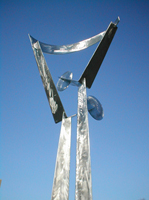
Bryn Mawr College

 |
Center Bryn Mawr College | 
|
February 5, 2003
Karen Tidmarsh (Dean of the College)
A Dean's Perspective: Effects of the Culture of Science on Students
Karen concluded with a number of figures indicating the very high percentage of students who earn grades lower than 3.0 in the introductory science and math courses here.
In discussion, several successful interventions were described. For instance, requiring porfolios in a General Chemistry class encourages work on a weekly basis, so professors can help students move through the semester in a "more measured" way. By asking for "recipes" for doing a problem, students learn to pay attention to what they are doing. By requiring essays that report on how students' habits have changed, professors can get an eye-opening look at how they struggle throughout the semester, and help them figure out BEFORE it is "too late" what is it they need to be doing differently.
Kaye Edwards, who directs the Multicultural Students Program at Haverford, participated in a tutorial on supplemental learning at Trinity. Based on the model she learned there, she is now offering "guided learning groups" at Haverford. The sessions are structured to be very interactive and focused, with repeated emphasis on "why one thinks" in a certain way, "why the answer is" what it is. Students spend surprisingly little time "on task," and one goal of these sessions is to help keep them on target.
Questio were raised about whether a focus on supplemental learning only reifies teaching methods which are ineffective in the courses themselves. Maybe we should make introductory science classes more interactive? Smaller? Re-think the relation between the size of the course and what is taught? The emphasis on coverage? (With inadequate study skills, students often have a problem keeping up with the volume.) Is there a way to make learning more self-paced? To increase feedback? To vary the kinds of feedback offered and sought (such as a student's verbal performance in small groups)?
Why has the model of the post-bacs, who form a community of learners, not caught hold among our undergraduates? There are multiple relaxed group sessions in labs, but many of our students still consider themselves independent scholars, who have no interest in the success of the group as a whole.
Good supplemental learning is largely dependent on teachers who are willing to become engaged with their students; programs which have expanded beyond this cadre of professors have been less successful.
It was also argued that we are skirting a structural problem here: there are reasons why certain groups perform less well in the sciences, and it is important for students to learn why. Without such a recogntion, putting the responsibility on individual students to "work hard!" sidesteps the larger cultural assumptions which reinforce poor performance.
The premise of all of these interventions is that all students, whatever their preparation, can do well. Does the Bryn Mawr faculty agree with that claim? If so, we need to seriously re-think our emphasis on assessment, laying aside talk about curves and grade inflation, and rhetoric about poor student performance.
This conversation continues on the
On-Line Forum and will resume in person next Thursday, February 13, when Katherine Park, a Historian of Science from Harvard, will ask "Was There a Renaissance Body?"
Home
| Calendar | About
| Getting Involved
| Groups | Initiatives | Bryn Mawr Home | Serendip Home
Director: Liz McCormack -
emccorma@brynmawr.edu
| Faculty Steering Committee
| Secretary: Lisa Kolonay
© 1994-
, by Center for Science in Society, Bryn Mawr College and Serendip
Last Modified:
Wednesday, 02-May-2018 11:57:05 CDT